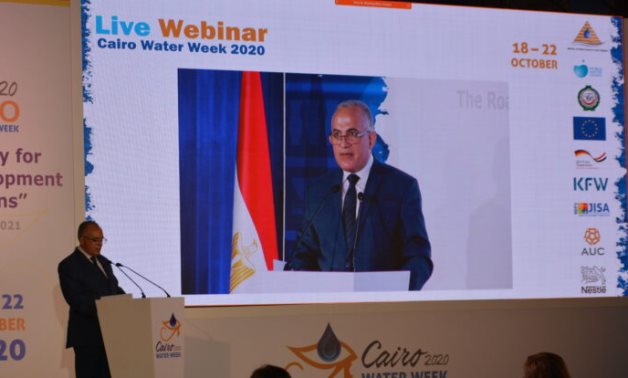
Egyptian Minister of Water Resources and Irrigation Mohamed Abdel-Atti gives a speech at the opening session of the 2020 Cairo Water Week (CWW) on Sunday, October 18, 2020- press photo
CAIRO – 18 October 2020: Egypt faces the challenge of reaching a fair agreement on the filling and operation of the controversial Grand Ethiopian Renaissance Dam (GERD) due to Ethiopia’s intransigent stances, which cause tremendous harm to the Nile downstream countries [Egypt and Sudan], said Egyptian Minister of Water Resources and Irrigation Mohamed Abdel-Atti in his speech at the opening session of the 2020 Cairo Water Week (CWW) on Sunday.
“We face the challenge of reaching a fair agreement on the filling and operation of the Grand Ethiopian Renaissance Dam, as while we support Ethiopia’s right to development and the need for energy, we request an Ethiopian understanding of the Egyptian water needs that represent the life for our people without exaggeration,” he said.
“Egypt has strived, since the signing of the Declaration of Principles on 23rd of March 2015 in Khartoum, to reach an integrated agreement on the dam filling and operation, taking into account the concerns of the three countries. However, the Intransigent Ethiopian stances prevented this. Joint cooperation is a necessity to reduce the negative impacts on the downstream countries as the filling and unilateral operation without coordination with the downstream countries will cause significant harm to the two downstream countries, especially during drought & flood periods,” Abdel-Atti continued.
The difference between Egypt, Sudan, and Ethiopia dates back to May 2011 when Ethiopia started building the dam; Egypt voiced concern over its water share [55.5 billion cubic meters]. Three years later, a series of tripartite talks between the two countries along with Sudan began to reach an agreement while Ethiopia continued the dam construction. In 2015, the three countries signed the Declaration of Principles, per which the downstream countries should not be negatively affected by the construction of the dam.
Abdel-Atti reviewed the water situation in Egypt and how it is problem exaggerating amid the limited water resources. “Egypt is considered the aridest country in the world, and the water sector in Egypt faces many challenges, especially with the growing gap between water demand and our limited water resources, thus the balance between the available resources and the needs remains a major challenge that must be faced. More than 97% of our water resources come from outside our borders at a time when we cannot count on groundwater as it is considered as a depletable and unsustainable resource,” he said.
He clarified that the ongoing increase of population in Egypt over the past 50 years has contributed to the decline of the rate of per capita water; 100 million of Egyptians live under the water poverty line by 50 percent, below the international line of 1,000 m3.
“Millions of the world’s populations will suffer from water shortage during the next 25 years unless united international efforts are exerted and effective measures and policies are put in place to face these challenges. Accordingly, the theme of this year’s Cairo Water Week is ‘Water Security for Peace ... and Development in Arid Zones’ in order to reflect these challenges,” Abdel-Atti said.
To save every drop of water and narrow the gap between the water consumption and available resources which represents 56 percent of total water resources, Abdel-Atti said that the government is recycling 25 percent of used water and 33 percent of total renewable resources, in addition to importing virtual water in the form of food commodities.
As for climate change impacts on Egypt, Abdel-Atti said that Nile Delta in northern Egypt is exposed to erosion as a result of sea-level rise, “which will negatively affect agriculture in the northern delta as a result of saltwater intrusion and contamination of groundwater resources leading to severe environmental, social and economic impacts that require undertaking climate changes adaptation measures as well as implementing an integrated plan to protect the Nile Delta, as it is one of the most vulnerable regions in the world.”
The Minister also discussed Egypt’s 2050 vision regarding the planning, development, and management of water resources, saying that the vision boils down to a four-way strategy of
1- Preserving water quality, protecting it from pollution and controlling negative environmental impacts in a way that preserves public health.
2- Rationalizing the use of all available water resources, maximizing their returns, and increasing their efficiency.
3- • Developing new water resources in cooperation with the Nile Basin countries and benefiting from a flash flood.
4-1- Creating the enabling environment to protect water resources through coordination and cooperation between all state institutions, raising public awareness on water issues and the need to rationalize water uses, and issuing the necessary legislation for the protection of our water resources.
Under the auspices of President Abdel Fatah El Sisi, the third edition of the Cairo Water Week (CWW) kicked off on Sunday.
The 2020 edition of the CWW, which comes under the slogan “Security for the production of peace and development in arid regions,” is being held online because of the coronavirus COVID-19 pandemic, according to a statement from the Ministry on Saturday.
The five-day CWW tackles five main topics including water security for sustainable development, cooperation for Achieving water security, Water-Food-Energy NEXUS, climate change, and water security, and innovative solutions for water security, according to the official website of the conference.
The CWW is being held annually in cooperation with the European Union, the United Nations’ Food and Agricultural Organization (FAO), and other international and Arab bodies to tackle water issues, amid climate change that impacts the world’s freshwater.

Comments
Leave a Comment